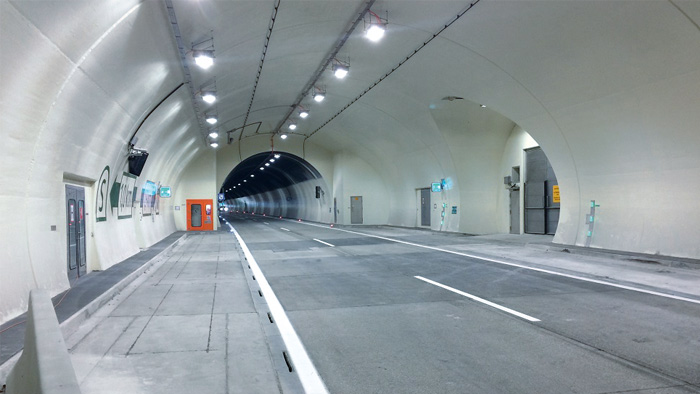In Austria, Switzerland, and Germany, fire assessments are carried out in tunnel systems to prove the functionality of the tunnel-dependent ventilation concept, which forms part of the acceptance protocol following renovation and conversion measures. An essential component of the functional testing process involves evaluating the reaction of the ventilation system. The fans must run in a defined direction and at a defined speed so that the smoke produced in the event of fire can be diverted in a controlled manner and the tunnel can be evacuated. This is why it is particularly important to be able to detect the flow velocity and direction.

SICK has been a supplier of tunnel sensor technology for many years. In addition to measuring pollutants and the visual range, the FLOWSIC200 also focuses specifically on measuring the flow velocity. Based on ultrasound technology, the measurement system features titanium sensors and measures both the flow velocity and flow direction.
Reliable measurement technology needed
 The measurement technology must be exceptionally reliable under extreme conditions – particularly in the event of a fire. If the fire is in a tunnel, however, there are fundamentally different requirements that have to be taken into consideration for the measurement technology. Both the immediate area surrounding the fire and the area surrounding the outflow of the flue gas are characterized by significantly different conditions than when the tunnel is in normal operation with ambient air. The flue gas temperature, flue gas composition, and also the gas propagation play an essential role when it comes to the function of the flow velocity measurement
The measurement technology must be exceptionally reliable under extreme conditions – particularly in the event of a fire. If the fire is in a tunnel, however, there are fundamentally different requirements that have to be taken into consideration for the measurement technology. Both the immediate area surrounding the fire and the area surrounding the outflow of the flue gas are characterized by significantly different conditions than when the tunnel is in normal operation with ambient air. The flue gas temperature, flue gas composition, and also the gas propagation play an essential role when it comes to the function of the flow velocity measurement
Together with the Austrian research association for internal combustion engines and thermodynamics, FVT – Forschungsgesellschaft für Verbrennungskraftmaschinen und Thermodynamik mbH, a total of four fire assessments were carried out in the Klaus tunnel system (A9). The findings were documented with data records. These assessments involved two FLOWSIC200 measurement systems being installed in the outflow area close to the source of the fire. The fire assessments were carried out at a location with unfavorable ventilation conditions. According to the calculations of a ventilation planner, a position approximately 1960 m from the (north) entrance portal of the tunnel was identified as the worst-case scenario. The lowest flow velocities were expected at this fire location with a large portal pressure at the south portal.
When evaluating the obtained data, it was found that the gas composition, gas temperature, and flow dynamics changed significantly in the area around the fire and in the immediate outflow area of the flue gas. The test demonstrated that the FLOWSIC200 from SICK accurately captures the particular dynamics of the tunnel flow – with impressive results. Its functionality in case of fire could be proven without any limitations. The flow measurement functioned reliably and without any significant power losses. Measurement availability was 100 percent in all experiments.
Download the whitepaper now:
Verification of the measurement function as part of fire testing in tunnel systems
Related posts:
Gas and dust measurement: limiting explosions
Ultrasonic flow measurement for steam: the smart choice
Sustainable measuring solutions in the energy industry
Waste-to-energy and transparent data: Early detection of untreated gas peaks
